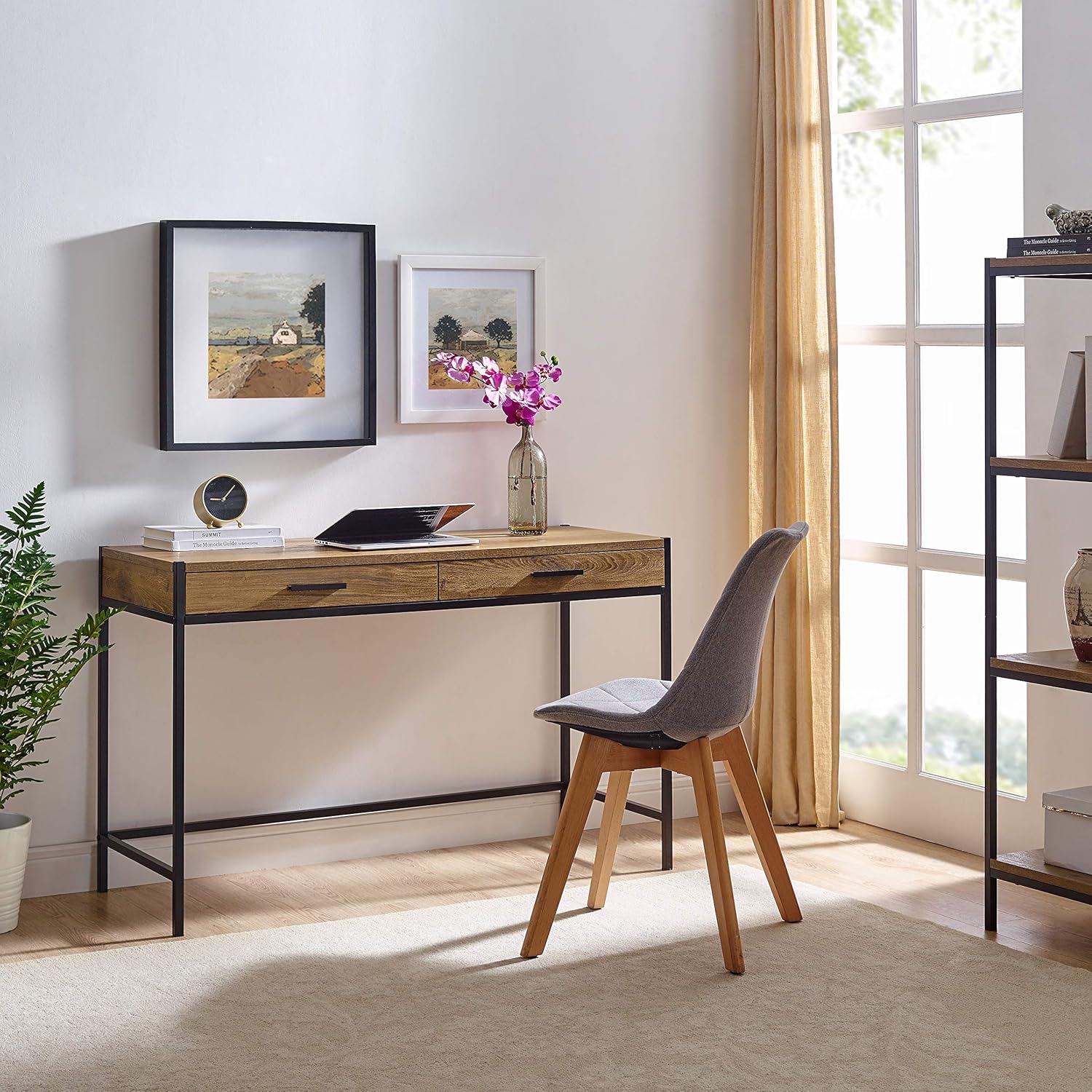Desks are staples in offices,home offices, and study rooms in the home.
This shall help you in choosing the best desk for you.
Typical in hotel lounges and lobby desks, this one has built-in storage units which keep everything away.

Here, the desktop keyboard is tucked in a sliding panel.
Documents and other equipment are hidden in different drawers.
As for form, it usually has an L-shaped look.

It has another set of drawers beneath and generally does not have leg room.
As a matter of fact, coffee table desks are default decorative pieces in accenting a living room.
It is positioned in front of the TV, in the middle of the seats.

They hold food, drinks, vases, magazines, books, and more.
6.Computer desk
Almost all modern home offices now feature a computer desk.
They come in different shape setups and other customizable configurations.

They can be L-shaped for a streamline workspace and can have built-in drawers beneath.
The credenza is that standing shelf featuring our prized silverware, figurines, picture frames, and more.
This one is considered as a standing desk, comparable to the frame and look of lectern desks.

12.Floating desk
This is also called the wall-mounted desk.
As the name suggests, this is directly mounted on the wall, like floating shelves.
The vertical frame of floating desks makes it an aesthetic addition especially to a bedroom.

This one is a space-saving desk and is usually found in bedrooms and dorm rooms.
They are often located in the hallway entrance so that you still have ample leg room to work efficiently.
14.Lap desk
This one does not have a standing frame and structure.

Some feature pencil and cup holders, making it an ergonomic desk.
15.Lectern desk
This one is made for standing presentations and in delivering speeches.
Modern lectern desks also now feature laptop mounts for more efficient use.

16.L-shaped desk
The best thing about L-shaped desks is that they streamline work in a decluttered look.
They can be a neat focal point in bedrooms and offices, especially for asymmetrical shaped spaces.
This one features a hood which rolls down over the work surface so that all the contents are protected.

It is also full of drawers on both sides plus drawers and cubbies all over the back panel.
19.Standing desk
This is perhaps the most common desk at par with work desks and computer desks.
20.Telephone desk
This is considered as the smallest key in of fixed desks.

Its main function is to have an ample work surface to hold notes while on the phone.
It is also used to hold logbooks, and telephone books for convenience.
It also has a built-in vertical drawer.

21.Treadmill desk
It is both a subtype of standing and computer desk but with a twist.
It is adapted to active workers who can think better while on the treadmill.
22.Trestle desk
This one is more of a portable, semi-permanent desk.

As the term implies, a trestle desk is made from linking two to three trestles using a stretcher.
On top of it, a tabletop or wood plank is placed for it to overall resemble a desk.
When it comes to leg room and ample work surface, a trestle desk is a practical choice.

Desk materials
Desks are essential because they give us a functional surface to work on any task.
1.Wood
It is the most common and most traditional desk material.
It is most used on work desks, executive, secretary and roll-top desks.

It can also be mounted on metal frames, and other materials.
From solid wood to softwood materials, wood desks are indeed very versatile.
2.Metal
If you dig an industrial and utilitarian look, metal desks are fine choices.

For one, it is a material that is resistant to scratching, scratching, stains, and scuffs.
It is also perfect as a combo material for wood and glass.
Only choose high grade metal materials to have a desk that is built to last.

While customizable, versatile and easy to clean, it is vulnerable to cracking and scratching.
Laminate desks are made of high-quality plastic coating, keeping the work surface stain and warp resistant.
They do not offer the most luxe look but laminate desks are versatile, and very practical.

FAQs
What are old-fashioned desks called?
It is not required but it is very practical.
However, on the downside, it could make the workstation feel cramped-up and claustrophobic.

The best way to position a desk is by considering your work pace and work habits.
Is a standing desk worth it?
Health and posture wise, yes, standing desks are worth it.

This pop in of desk is a response for sedentary working and extended hours of slouching.
It offers mobility, free movement and working while, well, standing.
What size is an executive desk?

As per rule of thumb, executive desks have a dimension of 60x30x30-inches.
What is the height of a typical desk?
Globally, the standard height recommended for desks would be at 28-30-inches tall.

Kids desks on the other hand are at 18-24-inches in height.
How much space do you need behind a desk for a chair?
For more space clearance and ease in movement, consider 30-inches and beyond.

What are the common desk shapes?
What is the best wood to use for desks?
Can desks be painted?

As with other pieces of furniture, yes, desks can be painted.
Some require more sanding and priming, however.
The best jot down of paint used in desks and furniture would be oil-based paints and other specialty paints.

With what we have covered here, there should be no shortage of desk choice for you.
Just opt for the one whose function would be well maximized for your needs.




